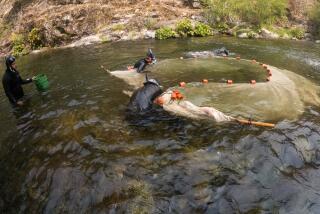Yakima Rebel Stands Ground for Fishing Rights : Indians: David Sohappy believes in tradition and an 1855 treaty guaranteeing an unlimited salmon and steelhead harvest.
- Share via
COOKS LANDING, Wash. — The old fishing platform sags, held up by ropes, a few rotting boards and perhaps the ghosts of fishermen who lived at a time when Indians pulled as many salmon as they wanted from the Columbia River.
David Sohappy, a Yakima religious leader and rebel, believes that is a right worth fighting for.
“I want to go fishing whenever I feel like it. With no strings attached whatsoever,” Sohappy says.
It is an idea as dated as the old-fashioned platform, long since supplanted by powerboats. But for Sohappy, there is no compromising his belief that Indians have the right to fish when and where they want, guaranteed by the Yakima Nation’s Treaty of 1855.
After 20 months in prison, suffering a stroke and being threatened with eviction from his ramshackle home, he still refuses to give up.
In 1984, U.S. District Judge George Boldt of Tacoma issued a ruling limiting Indian rights to half the harvestable salmon and steelhead in the Puget Sound region. That decision arose, in part, from protests Sohappy and other Indian began in 1968 over state restrictions on their fishing.
For all the fuss he has created, Sohappy rarely fishes. He prefers to spend his time watching soap operas and TV news. A frail 65-year-old man with one arm crippled by the stroke, he speaks barely above a mumble and leans on an old golf putter to walk.
“I speak softly but carry a big stick,” he joked, brandishing the putter.
In the latest chapter of this rebel’s saga, Sen. Brock Adams (D-Wash.) and Sen. Daniel Inouye (D-Hawaii), are asking the government to stop eviction efforts against Sohappy.
The government argues that the Cooks Landing fishing site where Sohappy lives with his wife and some of his seven children is supposed to be a river access point for all Indians, not a private home.
Sohappy built a long house--a communal dwelling that also serves as a church--on this spit of land on the shore of the mile-wide Columbia, east of Vancouver, Wash., in the early 1960s.
The long house stands as a protest to the flooding of more than 40 Indian homes and 37 of their fishing spots with construction of Bonneville Dam in 1937. The government agreed in 1945 to replace those homes and fishing sites, but little progress has been made.
Sohappy says he has a historic right to live and fish on the river and he will never leave the home to which he returned to after his release from prison in May, 1988.
“Move out and let them win? No way!” he said. “We still own the land.” Sohappy, a leader of the Indian feather religion, speaks of dire consequences for whites who harass Indians.
“They’re just asking for trouble,” he said. “People have told them to leave us alone. If they don’t, nature will step in and make you spend millions of dollars on weather-related things.”
The 365-page Department of the Interior appropriations bill contains one paragraph directing Interior Secretary Manuel Lujan to reconsider the eviction issue. The bill awaits President Bush’s signature.
Sohappy and his son, David Jr., were arrested by federal and state wildlife authorities in an undercover operation called “Salmonscam” in 1981 and 1982. They were accused of selling 317 fish out of season.
The Sohappys were convicted in federal court in Los Angeles in 1983 and sentenced to five years in prison. They served 20 months each and remain on probation.
A Yakima Tribal Court jury in 1987 acquitted them of tribal poaching charges. That trial, labeled “Tradition on Trial,” won international attention from human rights groups.
Some members were angry when the tribe prosecuted Sohappy, tribal prosecutor Jack Fiander said. Others were glad a violator of tribal fishing laws was on trial.
The tribe for 25 years has set fishing seasons for its members and rules for equipment, Fiander said. They prosecuted Sohappy to protect tribal authority in such matters, he said.
“David Sohappy, like any human being, is neither all good nor all bad,” Fiander said. “Sometimes, he was both.”
More to Read
Sign up for Essential California
The most important California stories and recommendations in your inbox every morning.
You may occasionally receive promotional content from the Los Angeles Times.













